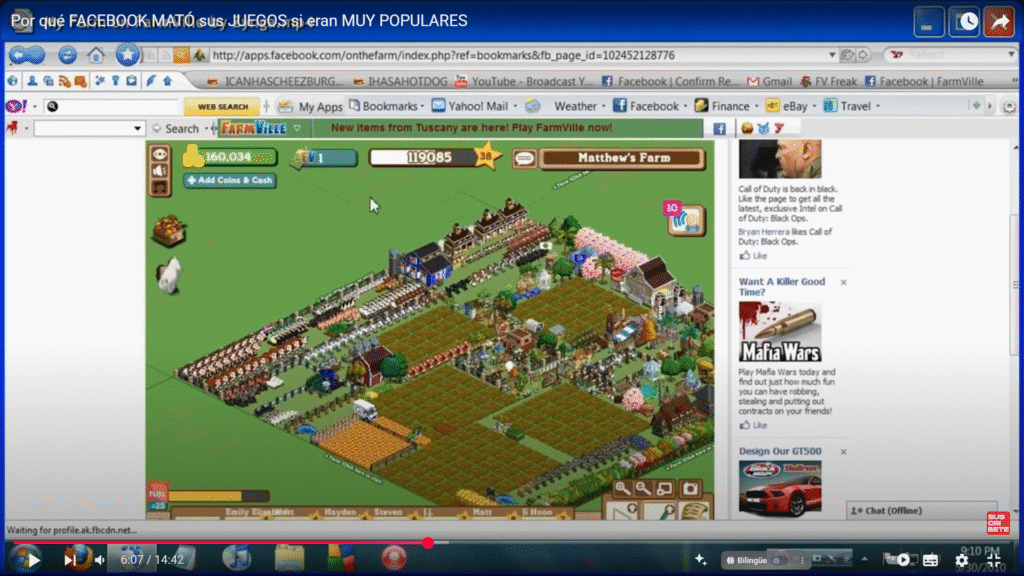If you log into Facebook today, the last thing you’d probably think about is playing a video game there. However, there was a time when your news feed was filled with notifications like “Your neighbor needs a tractor” or “John found a pink cow, do you want to help him?” Those were the years when Facebook transformed into the world’s largest virtual arcade , with millions of people—from your boss to your aunt—hooked on virtual farms, digital mafias, and pixelated pets.
What began as a social network for sharing photos and messages became, almost by accident, the birthplace of many of the mechanics that dominate mobile gaming today. From micropayments to daily rewards, this entire multi-billion-dollar business model has its origins in the golden eras of FarmVille, Mafia Wars, and Pet Society.
The birth of Facebook games
In May 2007, Mark Zuckerberg launched Facebook Platform , an open platform that allowed any developer to create applications within the social network. The innovative aspect was that these apps could use the user’s network of friends, their interactions, and their likes as part of the experience.
Soon, simple but compelling games began to appear. One of the first was Scrabulous , a Scrabble clone created by two brothers in India. At its peak, it attracted over 700,000 daily players, proving that people could log on to Facebook just to play.
From there, titles like Mafia Wars , Texas Hold’em Poker , and Lil Green Patch multiplied the addiction. But the real phenomenon was yet to come.
FarmVille: The Farm That Conquered the World
In June 2009 , Zynga’s FarmVille game launched, marking a turning point. The gameplay was simple: plant, harvest, raise animals, and decorate your land. However, the secret to its success lay in its social and reward dynamics :
- Each crop had a limited lifespan, forcing players to return several times a day.
- Sharing achievements with friends granted coins, gifts or extra benefits.
- The more neighbors you had, the bigger and more productive your farm was.
Within weeks, FarmVille surpassed 26 million daily users and reached a peak of 80 million monthly players , more than all of PlayStation, Xbox, and Nintendo’s consoles combined at the time.
A year later, Zynga repeated the formula with CityVille , reaching more than 100 million monthly users. The boom was unstoppable.
Why were these games so addictive?
The key was a mix of psychological and technological strategies that would later inspire the entire gaming and mobile app industry:
- Daily rewards : Every day you logged in you got a gift.
- Social pressure : If you didn’t help your friends, you could fall behind in the competition.
- Premium Economy : The game was free to play, but paying with real money sped up processes or unlocked exclusive items.
- Gamification of daily life : Simply planting virtual tomatoes felt like an important task thanks to constant notifications.
It’s no coincidence that today apps like Duolingo, TikTok, and even smartwatches use similar mechanics to engage their users.
The decline of Facebook gaming
Nothing lasts forever, and starting in 2011, the virtual farm and mafia craze began to die down. There were two main reasons:
- Facebook Algorithm Changes:
Non-gaming users were tired of spam. The social network decided to limit the visibility of gaming notifications, effectively curbing the virality that fueled their growth. - The Arrival of Smartphones
Between 2011 and 2012, smartphones became widespread. Games like Candy Crush , Clash of Clans , and Angry Birds offered similar experiences, but with the added benefit of sending push notifications directly to your phone.
Added to this was the demise of Adobe Flash in 2020, which marked the end of iconic titles like FarmVille and Pet Society.
The legacy that lives on in today’s games
Although many of these titles have been forgotten, their influence remains. The core mechanics that originated on Facebook are now standard in video games and apps:
- Virtual currencies and micropayments .
- Temporary events and daily login rewards .
- Social interaction as a driver of progress .
- Gamification in non-entertainment apps , such as education or fitness.
In other words, the FarmVille formula was the template for modern mobile gaming .
What we can learn from that time
- Virality isn’t everything : Relying on an external platform, as Zynga did with Facebook, can be a double-edged sword.
- Player psychology is just as important as the technology : small stimuli like notifications or rewards make a difference.
- Content must evolve : what is engaging one day can feel repetitive the next if it is not updated.
Today, when your phone reminds you that you have maximum energy in a game or when an app rewards you for logging in, you’re experiencing a refined version of what was born more than 15 years ago on Facebook.
The next time you nostalgically recall your aunt waking up early to harvest virtual tomatoes, consider this: those digital farms were the testing grounds where the seeds for the multi-million dollar mobile gaming business were planted.
And you? Did you ever tend your farm, or did you prefer Mafia Wars? Maybe you’ve forgotten, but without realizing it, you were part of a digital revolution that’s still bearing fruit.
📌 Don’t miss the opportunity to relive that gaming nostalgia : try some of these titles again in their current mobile versions or reflect on how these mechanics influence your digital life today.



